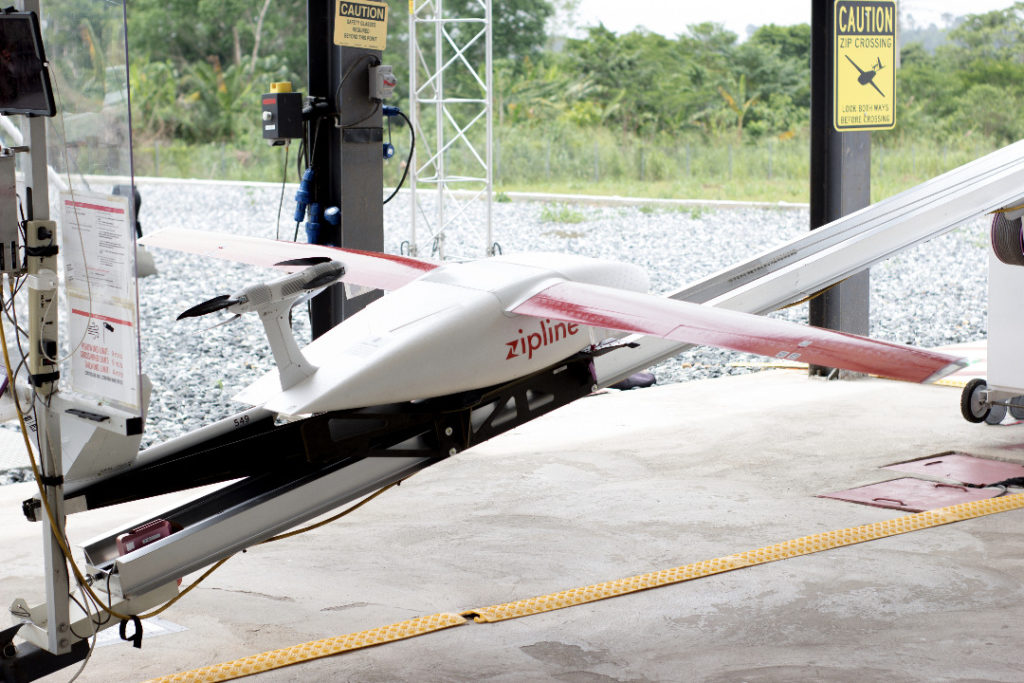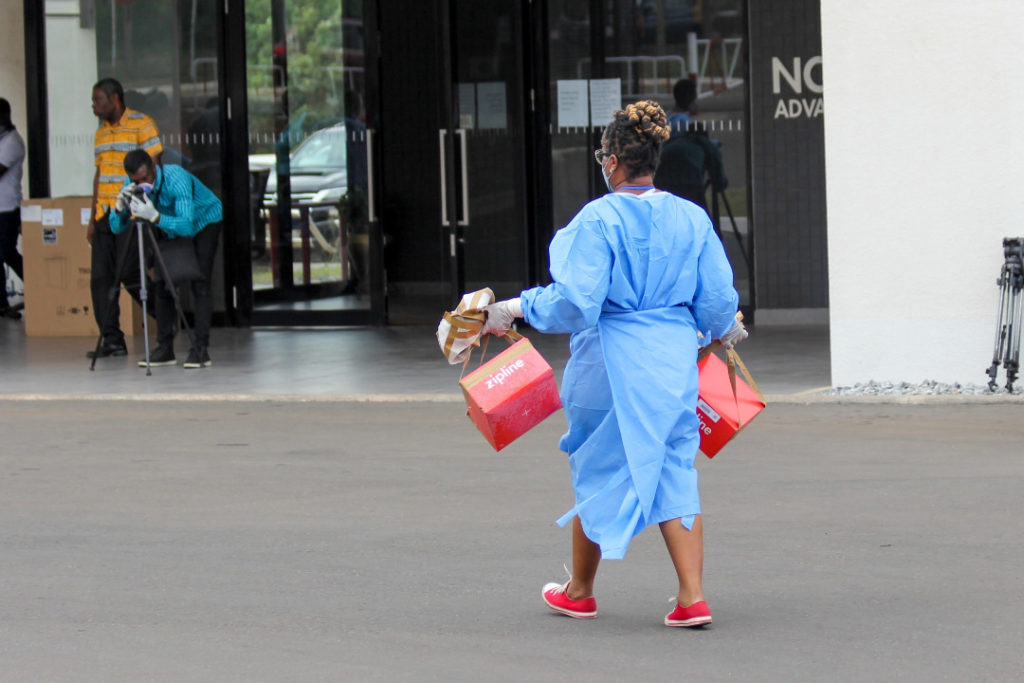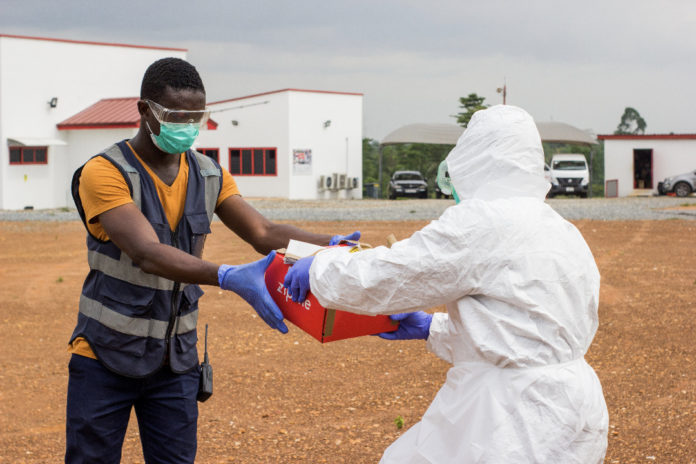|
Getting your Trinity Audio player ready...
|
Zipline, the world’s only national scale on-demand drone delivery service, has announced that it has begun delivering COVID-19 test samples.
Zipline drones now fly test samples collected from patients in more than 1,000 health facilities located in difficult to reach rural areas of Ghana to Noguchi Memorial Institute for Medical Research laboratories in Accra, the nation’s capital, and Kumasi Center for Collaborative Research (KCCR) in Kumasi, the country’s second-largest city. The revolutionary new service improves the Government of Ghana’s ability to monitor the spread of COVID-19 more quickly. It is one of several ways Zipline is helping the country respond to the pandemic.
“Zipline is dedicated to helping Ghana in its fight against the COVID-19 pandemic,” said Zipline CEO Keller Rinaudo. “Using contactless drone delivery to transport COVID-19 test samples will allow the government to respond to the pandemic and help save lives more quickly.”

“Thanks to the partnership with the Ministry of Health and with the help of the Ghana Civil Aviation Authority, Zipline is now able to further strengthen Ghana’s response to the pandemic,” said Daniel Marfo, General Manager of Zipline in Ghana.
The service began on Friday, April 17, when 51 COVID-19 test samples collected from patients at rural health facilities were transported to Zipline’s distribution center in Omenako, Ghana. Over the course of four separate flights, each more than 70 miles/116km’s round tip, Zipline delivered the 51 samples to the Noguchi Memorial Institute for Medical Research in Accra for testing and analysis.
The company will also be delivering COVID-19 test samples collected at regional hospitals near its Mampong distribution center to the Kumasi Center for Collaborative Research, a nearly 60 mile/100km round trip flight. The first such delivery took place on Saturday, April 18, 2020. The company expects to operate this new daily service for the duration of the Government’s COVID-19 response efforts. This marks the first time in history that autonomous drones have been used to make regular long-range deliveries into densely populated urban areas. It is also the first time that drones have been used in this way to deliver COVID-19 test samples.
About The COVID-19 Test Sample Delivery Service
The new COVID-19 test sample delivery service allows the government to more closely monitor and respond to the spread of the disease in some of the country’s most remote and challenging to reach areas. Before Zipline, COVID-19 test sample delivery could take between many hours to many days before a delivery truck had collected a sufficient number of samples from rural hospitals before it could return to the city.
The time delay not only jeopardized the government’s ability to respond swiftly but also increased the risk that the samples were damaged in transit due to broken cold-chain storage. Using Zipline’s drones to deliver COVID-19 test samples helps save both time and money. Health facilities no longer need to wait to collect a sufficient number of tests to justify a truck delivery. Now, a single test from a rural area can be transported for analysis in under an hour.

The company has taken many steps to ensure that it is operating the safest delivery system of its kind in the world, including rigorous testing of flight software and aircraft hardware, flight operations safety procedures, redundant inflight safety features, and modular frangible design. Zipline drones are designed to automatically detect issues inflight and safely return to base for repair.
Test samples are packaged in accordance with the World Health Organization’s Interim Laboratory Biosafety Guidelines for Handling and Processing Specimens Associated with Coronavirus Disease 2019. Each drone is equipped with redundant flight computers, motors, communications systems, flight control surfaces, as well as redundant navigation and power systems. In the event of emergencies like severe weather, emergency requests from air traffic control, or unplanned flight operation issues, each drone is equipped with a parachute that allows it to make an immediate landing by slowly descending to the ground.
Zipline’s International COVID-19 Response Efforts
In addition to the new COVID-19 test sample delivery service, Zipline is helping the Governments of Ghana and Rwanda prepare for and respond to the pandemic in several ways. As countries seek to reduce social contact, shifting the primary delivery of vaccines and medicines from trucks to drones helps to reduce the risk of increased exposure.
Zipline provides decision-makers with real-time visibility into demand across the health system and serves as an early warning system for potential outbreak hotspots. In Ghana, Zipline holds all emergency stocks of personal protection equipment for the facilities it serves, like gloves and masks, allowing health authorities to target distribution to regional providers on an as-needed basis.
The company is helping to reduce hospital overcrowding in Ghana, as patients seek more basic or maintenance care at clinics closer to home. This helps free up beds for patients who truly need them and reduces the risk of exposure to non-infected patients seeking care. In Rwanda, Zipline is working with Partnerships in Health to deliver chemotherapy medications to cancer patients who are unable to travel to the hospital due to the pandemic.
During disasters and outbreaks, Zipline can respond to demand surges and prevent stock-outs by immediately increasing delivery volumes. New vaccines, test kits, and other innovations can be added to the inventory as soon as they are available and delivered in real-time to help meet extraordinary needs.
COVID-19 related national shutdowns have caused the cancelation of many blood drives in countries around the world, putting a strain on supply. Zipline’s ability to centralize blood stocks and distribute them just-in-time to health care providers helps to increase patient access, lower waste, and save lives.
COVID-19 Emergency Operations in the United States
Before COVID19, Zipline planned to launch in the United States this fall, delivering to health facilities and ultimately to homes. The company believes that COVID-19 presents such an imminent threat to the country that it is prepared to begin emergency humanitarian operations in the United States right away. Zipline has been working very closely with the FAA on the necessary approvals and could begin operating within weeks of receiving the go-ahead.
The company’s emergency efforts in the United States would focus on distributing scarce resources like test kits and personal protective equipment like masks and gloves across the health systems more efficiently and effectively. The company can also help keep vulnerable non-COVID19 patients with chronic and underlying conditions away from the hospitals—both to prevent exposure and to keep from overwhelming the system—by delivering care closer to where they live. And once a COVID19 vaccine is ready, Zipline can help make sure the distribution is targeted in real-time to the people and populations that need it most.
Source: Daily Mail GH





